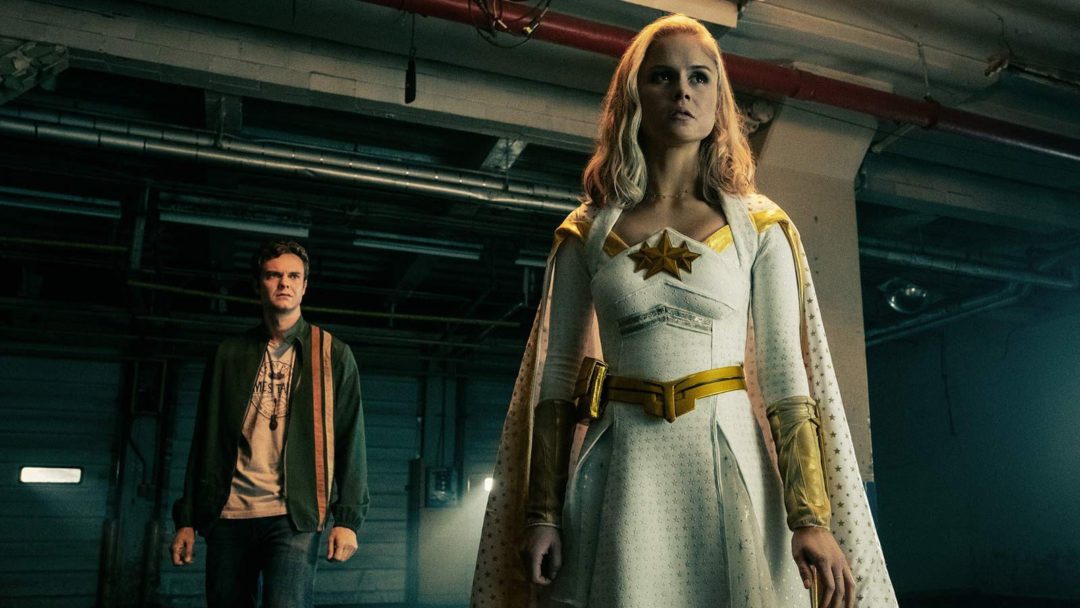A hero’s birthplace is a key component of their origin story, allowing the audience to fill in the blanks in their character with assumptions about where they’re from. Superman gets his folksy, all-American feel by being raised on a Kansas farm while Spider-Man’s New York City roots give him strong neighborhood ties.
The Boys understands that power. Amazon Prime’s new dark corporate superhero satire contains versions of Superman, The Flash, and Aquaman that are selfish, perverted, or outright evil. The one good hero is Starlight, and it’s because she comes from Iowa.

The state of Iowa is regularly presented as a form of narrative shorthand for America’s heartland, used as a homeplace for heroes with the same “farm boy” origin story as Clark Kent or Luke Skywalker. The state is synonymous with rolling hills, historical farms, churches, and plains packed with corn. It’s biggest events are the nation’s first presidential caucus and the state fair, which means presidential hopefuls can often be found blustering beside a fried Twinkie stand. Iowans themselves are polite, mild-mannered, and at least a touch naive. In other words, it’s as Midwest as the Midwest gets.
I spent my first 18 years diving in Des Moines, Iowa and experiencing its humid summers and chilling winters, and I can attest that Iowa’s capital city embodies the typical Midwest Americana exhibited by the charming Captain Kirk in the J.J. Abrams Star Trek reboot or the setting of the farm-turned-baseball field fable, Field of Dreams. It’s all so romantic.
However, Iowa’s utilization as a picturesque storytelling device is regularly flipped upside down. In a best case scenario, Iowa is the butt of a joke poking fun at rural Midwestern naivety like with Private Donut in Rooster Teeth’s Red vs. Blue. In a worst case scenario, Iowa represents suburbia’s sinister underbelly obscured by adorably hokey small towns and beautiful oceans of corn. This hidden vileness can be observed by the bigoted bartender in Guillermo Del Toro’s The Shape of Water and even by Des Moines-based heavy metal band Slipknot. Their defining album, Iowa, features a conceptual thematic message about the state being the cause behind the band’s moral corruption. Slipknot even teamed up with Amazon and The Boys for a brutal music video for a new song, “Solway Firth.”
Starlight experiences a similar loss of innocence in The Boys. Just like Slipknot and me, she leaves Des Moines to follow her dreams. In her case, it’s becoming a member of The Seven, a Justice League- or Avengers-style team that is run by corporate overlords. After arriving in New York City, Starlight realizes that Earth’s mightiest heroes are corrupt and value power, money, sex, TV ratings, sponsorships, and drugs more than actual heroism.
Starlight regularly finds herself in morally compromising situations caused by her often villainous teammates. The exploits of characters like the psychotic Superman/Captain America rip-off Homelander, rapey Aquaman riff The Deep, and narcotic-indulging Flash parody A-Train cause Starlight to suppress her Iowan values. Starlight’s internal turmoil devastates her because if she were to act on her morals and stay true to her values, she would lose her big-time superhero status and be removed from The Seven.
This thematic loss of purity also extends to the show’s main protagonist, Hughie Campbell. At the beginning of The Boys, Hughie is a regular young guy geeking out over electronics, fawning over superheroes, and telling adorkably bad sex jokes to his girlfriend. He loses his innocence when A-Train bursts through his girlfriend in a spray of blood and bone. Hughie is rightfully horrified to be clutching his girlfriend’s severed hands, but A-Train escapes without any form of punishment despite having committed a lethal hit-and-run while running under the influence. The only justice Hughie gets is a payout from A-Train’s corporate sponsors. Hughie’s faith in superheroes is shattered. His childhood bedroom is stuffed with superhero memorabilia before he ultimately trashes it in a fit of therapeutic rage. His girlfriend and his innocence are gone.

Starlight makes this same realization further into The Boys’ first season. After experiencing a turbulent work environment that’s more depraved than advertised, she attends a Christian festival in order to reconnect with her religious Iowan roots. To her surprise, Starlight finds a similar corruption at the event. There are tents promoting merchandise and preaching ideals against LGBTQ people and premarital sex. To her shock, Starlight learns that these judgmental stalls were always present at this festival and in her Iowa home. Just like The Seven, Starlight’s innocent Midwestern Iowa values were always problematic; she just didn’t know it.
Outsiders might find Starlight’s sudden epiphany unbelievable. Many Midwestern religious types are openly homophobic and sexist, so it seems odd that Starlight takes so long to become conscious of the hate associated with some religious beliefs. But when young, there isn’t a basis for what “normal” looks like. If your coming of age happens in Des Moines, Iowa, that will be your normal. Similarly, if you live in a world where America’s newest booming celebrity superhero industry regularly brutally murders innocent citizens, that too will be seen as normal.
Growing up means questioning the status quo. After years of experience, we may eventually begin to realize that the values we were raised with don’t match up with our current morals and actions. In the case of The Boys, this realization means being a superhero isn’t synonymous with being heroic, that heroes can be the villains, and that innocent little Des Moines, Iowa isn’t so innocent after all. In fact, it’s just as messed up as everywhere else.





Published: Aug 17, 2019 12:00 pm